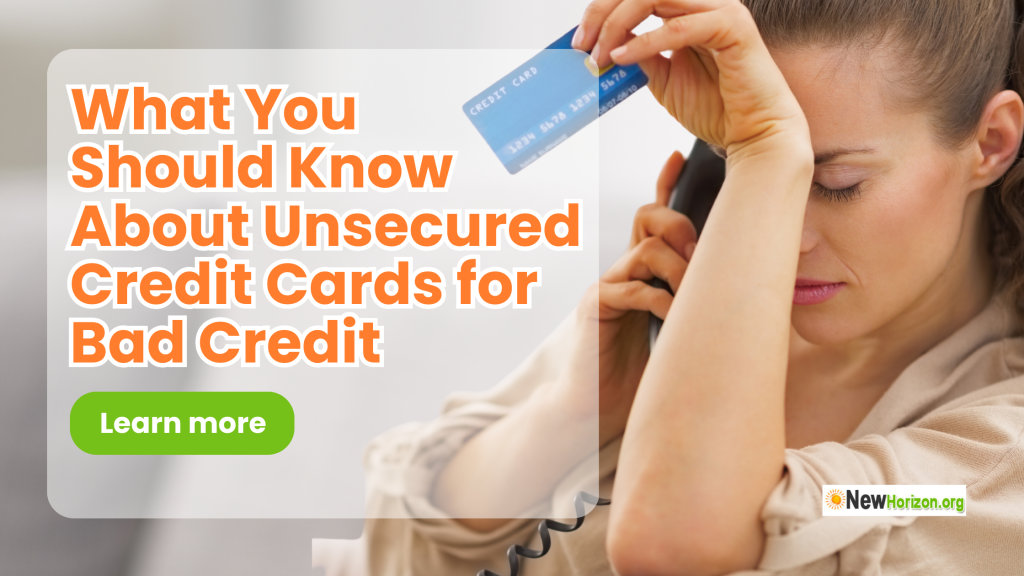Q. What is the difference between unsecured credit cards for bad credit vs one for good credit? What credit scores are used for approval?
The primary differences between unsecured credit cards for good credit and those for bad credit lie in the terms, benefits, and requirements for approval.
In this article, we’ll take a look at:
Unsecured Credit Cards for Bad Credit
Features and Benefits:
-
Higher Interest Rates: Typically have higher APRs due to the increased risk to the issuer.
- Lower Credit Limits: Offer lower credit limits, reflecting the higher risk associated with lending to individuals with bad credit.
- Fewer Rewards: May offer limited or no rewards programs.
- Higher Fees: Often come with higher annual fees, application fees, maintenance fees, and other charges.
- Credit Building: Designed to help users rebuild their credit by reporting payment activity to the major credit bureaus.
Credit Score Requirements:
- Bad Credit Score Range: A FICO score below 580 is generally considered poor.
- Fair Credit Score Range: A FICO score of 580-669 is considered fair, and some cards for bad credit may approve applicants in this range.
- Approval Likelihood: Higher than for good credit cards, but still dependent on other factors such as income and recent credit behavior.
Unsecured Credit Cards for Good Credit
Features and Benefits:
-
Lower Interest Rates: Typically have lower annual percentage rates (APRs) compared to creditcards for bad credit.
- Higher Credit Limits: Offer higher credit limits due to the cardholder’s proven creditworthiness.
- Rewards Programs: Often come with robust rewards programs, such as cash back, travel points, or other incentives.
- Additional Perks: May include perks like travel insurance, purchase protection, extended warranties, concierge services, and access to airport lounges.
- Lower Fees: Tend to have lower fees, including lower or no annual fees, and fewer additional charges.
Credit Score Requirements:
- Good Credit Score Range: Generally, a FICO score of 670-739 is considered good.
- Excellent Credit Score Range: A FICO score of 740 and above is considered excellent.
- Approval Likelihood: High for applicants within these score ranges, provided they meet other criteria such as income and debt-to-income ratio.
Comparison Table
| Feature/Aspect | Unsecured Credit Card for Good Credit | Unsecured Credit Card for Bad Credit |
| Interest Rates (APRs) | Lower | Higher |
| Credit Limits | Higher | Lower |
| Rewards Programs | Robust (cash back, points, travel) | Limited or none |
| Additional Perks | More extensive (travel insurance, etc.) | Fewer perks |
| Fees | Lower (annual, application, etc.) | Higher (annual, maintenance, etc.) |
| Credit Score Requirement | 670-739 (good), 740+ (excellent) | Below 580 (poor), 580-669 (fair) |
| Approval Likelihood | High for good/excellent scores | Higher for bad/fair scores |
 How to Choose the Right Card
How to Choose the Right Card
- For Good Credit:
- Look for cards with the best rewards programs that match your spending habits.
- Consider cards with low or no annual fees.
- Take advantage of additional perks and benefits.
- For Bad Credit:
- Focus on cards designed to help rebuild credit. Ensure they report to all three major credit bureaus.
- Be mindful of fees and interest rates. Opt for cards with reasonable terms.
- Use the card responsibly by keeping balances low and making payments on time to improve your credit score.
Q. What does it mean when a credit card company says they do a soft credit check? I’m trying to rebuild my credit and I don’t want to it hurt my credit score.
A. When a credit card company says they do a soft credit check, it means they will review your credit report without affecting your credit score. They call this a soft inquiry and it won’t hurt your credit score. It won’t even show up on your credit report when a bank does an inquiry!
Soft Credit Check
- Purpose: Soft credit checks (or soft inquiries) are typically used for pre-qualification offers, background checks, and personal credit checks. They allow companies to get a general idea of your creditworthiness without impacting your credit score.
- Examples: Checking your own credit, pre-qualification for credit cards or loans, background checks by potential employers, and some types of rental applications.
Impact on Credit Score
- No Impact: Soft credit checks do not affect your credit score. They are not visible to other creditors or lenders who may review your credit report.
- Frequency: You can have multiple soft credit checks without any negative consequences on your credit score.
Soft Credit Check vs. Hard Credit Check
Soft Credit Check
- Used For: Pre-qualification, background checks, personal credit checks.
- Impact on Credit Score: None.
- Visibility: Visible only to you on your credit report.
Hard Credit Check
- Used For: Applying for credit cards, loans, mortgages, and other forms of credit.
- Impact on Credit Score: Can lower your credit score by a few points. Multiple hard inquiries in a short period can have a more significant impact.
- Visibility: Visible to other creditors and lenders.
Why Credit Card Companies Use Soft Credit Checks
- Pre-Qualification Offers: Credit card companies use soft credit checks to determine if you meet the initial criteria for a credit card without performing a full credit inquiry. This allows them to make pre-approved or pre-qualified offers.
- Customer Inquiry: When you check if you pre-qualify for a credit card on a company’s website, they typically perform a soft credit check.
Benefits of Soft Credit Checks
- No Impact on Credit Score: Allows you to explore credit options without damaging your credit.
- Pre-Qualification: Helps you determine your chances of approval before submitting a formal application, potentially saving you from unnecessary hard inquiries.
What to Expect
Pre-Qualification Results: If you pre-qualify for a credit card based on a soft credit check, it doesn’t guarantee approval. A full (hard) credit check will be conducted if you decide to formally apply for the card.
Understanding the difference between soft and hard credit checks can help you manage your credit more effectively and make informed decisions about applying for credit.
Q. What is the difference between an unsecured credit card and a catalog card?
A. An unsecured credit card and a catalog card are both types of credit cards, but they serve different purposes and have distinct features.
Unsecured Credit Card
An unsecured credit card is a traditional credit card that does not require a security deposit. Approval is based on the applicant’s creditworthiness, which is assessed through a credit check.
Key Features
- No Security Deposit: Unlike secured credit cards, unsecured credit cards do not require a cash deposit.
- Credit Limit: The credit limit is determined by the issuer based on your credit score, income, and overall creditworthiness.
- Rewards and Benefits: Many unsecured credit cards offer rewards programs, such as cash back, travel points, and other perks. These reward programs are typically given to people with good to fair credit, although there are a few bad credit credit cards that are now offering rewards.
- Interest Rates and Fees: Interest rates (APRs) and fees vary widely. Cards for those with good to excellent credit tend to have lower rates and fees, while cards for those with poor credit may have higher rates and fees.
- Uses: Can be used anywhere that accepts credit cards, including online and in-store purchases, balance transfers, and cash advances.
Catalog Card
A catalog card is a type of credit card that can only be used to make purchases from a specific catalog or online store associated with the card issuer. These cards are often marketed to individuals with poor or no credit. Some may offer credit builder services in which they will report your payment history and help you to build or rebuild credit.
Here’s a list of catalog credit cards that offer opportunities for building credit:
 Freedom Gold Card
Freedom Gold Card
- $750 Unsecured Credit Limit (Usable only at TheHorizonOutlet.com)
- Instant Approval*
- No Credit Check
- Sezzle
- A better way to get a Card Offer!
- Secured Cards
- Search, Compare, Apply!
- Net First Platinum
- No Employment or Credit Check
- Bad Credit, No Credit – OK
- Always 0.0% APR
- Group One Platinum Card
- No Employment or Credit Check
- Bad Credit, No Credit? No Problem!
- Fast and Easy Application
- Boost Platinum Card
- Bad Credit, No Credit? No Problem!
- Fast and Easy Application
- No Employment or Credit Check
Key Features
- Limited Use: Can only be used for purchases from the issuer’s catalog or online store, not for general purchases.
- Credit Limit: The credit limit is generally a set amount that is set by the issuer. Since many don’t pull credit, they have no way of setting a limit based on your creditworthiness.
- No Security Deposit: Similar to unsecured credit cards, catalog cards typically do not require a security deposit.
- Interest Rates and Fees: Rates and fees will vary based on the issuer. Some catalog cards don’t have any fees, but their monthly interest rate maybe high. While some may have membership fees.
- Credit Building: Some catalog cards report your payment activity to the major credit bureaus, which can help build or rebuild your credit if used responsibly.
Comparison Table
| Feature | Unsecured Credit Card | Catalog Card |
| Security Deposit | Not required | Not required |
| Credit Limit | Based on creditworthiness | Based on credit profile, generally lower |
| Rewards/Benefits | Often includes rewards programs | Typically no rewards |
| Interest Rates/Fees | Varies widely, generally lower for good credit | Often higher, includes additional fees |
| Usage | Anywhere that accepts credit cards | Only for purchases from specific catalog/store |
| Credit Building | Yes, reports to major credit bureaus | Yes, if the issuer reports to major credit bureaus |
Which One to Choose?
- Unsecured Credit Card For Bad Credit: Suitable for those with poor credit looking for a versatile card that can be used widely.
- Catalog Card: May be a good option for those with poor or no credit who are looking to build or rebuild their credit, but should be used with caution due to higher fees and limited usability.
Important Considerations
- Credit Building: Make sure that the card reports to all three credit reporting agencies (Experian, Equifax, and TransUnion) to help build your credit profile.
- Costs: Review the fees and interest rates associated with the card. High fees and APRs can outweigh the benefits if not managed properly.
- Usage Needs: Consider how and where you plan to use the card. An unsecured credit card offers more flexibility for general use, while a catalog card is restricted to specific purchases.
Q. I keep getting turned down for credit card offers, even the ones for people with bad credit. What can be the reason for this?
A. There are several potential reasons why this might be happening:
-
 Credit Score is Too Low
Credit Score is Too Low
- Even cards for bad credit have minimum score requirements. If your credit score is extremely low (e.g., below 500), you might still be denied. At this point you may want to look for a secured credit card. Many of these cards offer guaranteed approval.
- Recent Negative Marks
- Recent late payments, defaults, collections, or bankruptcies can significantly impact your ability to get approved.
- High Debt-to-Income Ratio
- Lenders consider your debt-to-income ratio (DTI) to determine your ability to manage additional debt. If your DTI is high, it might lead to a denial.
- Multiple Recent Credit Applications
- Applying for several credit cards in a short period can result in multiple hard inquiries, which can lower your credit score and signal to lenders that you are a higher risk.
- Limited Credit History
- If you have a very limited or no credit history, lenders might be hesitant to approve you for a card, even one for bad credit.
- Errors on Credit Report
- Errors or inaccuracies on your credit report can negatively affect your score. It’s crucial to check your credit reports before you apply for a loan or credit card so that you can dispute any errors.
 7. Unstable Employment or Income
7. Unstable Employment or Income
-
- Lenders look for steady income and employment history. If your income is unstable or you frequently change jobs, it might affect your approval chances.
- High Credit Utilization
- If you have high balances relative to your credit limits, this high utilization ratio can negatively impact your credit score and approval chances.
Q. Which is better for building credit? A secured credit card or an unsecured credit card for bad credit that gave me a low credit limit and the interest rate is kind of high?
A. Choosing between a secured credit card and an unsecured credit card for building credit depends on several factors, including your current credit situation, your ability to manage credit responsibly, and the specific terms and conditions of the cards you’re considering. Here’s a comparison to help you decide which might be better for building credit:
Secured Credit Card
Advantages
- Easier Approval: Secured credit cards are generally easier to obtain, even with poor credit, because they require a security deposit.
- Credit Building: Like unsecured cards, secured credit cards report to the major credit bureaus, helping you build or rebuild your credit.
- Lower Risk: The credit limit is usually equal to your deposit, which can help prevent overspending and accumulating debt.
- Potential for Upgrading: Some issuers offer the possibility to upgrade to an unsecured card after a period of responsible use.
Disadvantages
- Security Deposit: Requires an upfront deposit, which can be a barrier if you don’t have the cash available.
- Limited Credit Line: The credit limit is tied to your deposit, which might be lower than an unsecured card’s limit.
- Fees and Rates: Some secured cards may have annual fees and higher interest rates, although they can be more reasonable compared to subprime unsecured cards.
Here’s a list of some of the best secured credit cards currently available, catering to various credit-building needs:
 Applied Bank® Secured Visa® Gold Preferred® Credit Card
Applied Bank® Secured Visa® Gold Preferred® Credit Card
- Better than Prepaid…Go with a Secured Card! Load One Time – Keep On Using
- Absolutely No Credit Check or Minimum Credit Score Required
- Automatic Reporting to All Three National Credit Bureaus
- CreditSoup
- A better way to get a Card Offer!
- Secured Cards
- Search, Compare, Apply!
Unsecured Credit Cards for Bad Credit
Advantages
- No Security Deposit: Does not require an upfront deposit, which can be more convenient if you lack extra funds.
- Higher Credit Limit: Potentially higher credit limits compared to secured cards, even if starting low.
- Credit Building: Reports to the major credit bureaus, helping you build your credit with responsible use.
Disadvantages
- Higher Interest Rates: Often come with higher interest rates, which can lead to significant debt if you carry a balance.
- Fees: May have higher fees, including annual fees, maintenance fees, and other charges.
- Stricter Approval: Can be harder to get approved compared to secured cards, especially if your credit is very poor.
 Considerations for Building Credit
Considerations for Building Credit
- Credit Utilization: Both types of cards help build credit by showing responsible use. Keep your credit utilization low (preferably below 30% of your credit limit).
- On-Time Payments: Make all payments on time, as this is one of the most significant factors in your credit score.
- Avoiding Debt: Whether secured or unsecured, avoid carrying a balance to prevent paying high interest rates. Aim to pay off your balance in full each month.
Which is Better?
- If You Have the Deposit: A secured credit card can be a safer option for building credit without the risk of high-interest debt. It also tends to have a more straightforward path to approval and might offer a clearer upgrade path to an unsecured card in the future.
- If You Lack the Deposit: An unsecured card might be more convenient, but you should be mindful of the higher interest rates and fees. It’s crucial to use it responsibly, keeping your balance low and paying off the full balance each month to avoid interest charges.
For many people with bad credit, starting with a secured credit card is often the better and safer route to rebuilding credit. It provides a structured environment with a lower risk of falling into debt due to high-interest rates. Once your credit improves, you can transition to an unsecured card with better terms.
However, if you opt for an unsecured card, choose one with reasonable fees and manageable interest rates, and ensure you can commit to paying off your balance in full each month.
Q. Can a secured credit card become unsecured? If so, how?
A. Yes, a secured credit card can become unsecured. This process is often referred to as “graduating” or “upgrading” your secured card to an unsecured card. Here’s how it typically works and the steps involved:
Steps to Transition from Secured to Unsecured
- Check Your Issuer’s Policy:
- Research: Find out if your card issuer offers a graduation program. Some issuers clearly state their policies on upgrading secured cards to unsecured ones.
- Contact Customer Service: If the information isn’t readily available, contact customer service to inquire about the process and what criteria need to be met.
- Build Positive Credit History:
- Make Consistent Payments: Ensure all payments are made on time.
- Maintain Low Balances: Keep your balances low relative to your credit limit.
- Monitor Credit Score: Regularly check your credit score to track your progress.
- Request the Upgrade:
- Prepare Your Case: If you’ve been using your secured card responsibly for at least 6 to 12 months, prepare to request an upgrade.
- Call Your Issuer: Contact your issuer’s customer service and ask if you qualify to transition to an unsecured card. Highlight your good payment history and improved credit score.
- Follow Up: If your initial request is denied, ask what specific criteria you need to meet and when you can reapply.
- Receive Your Security Deposit:
- Deposit Return: Once your card is upgraded to unsecured, your issuer will refund your security deposit, usually as a credit to your account or via a separate check.
- Review Terms: Review the terms of your new unsecured card, including any changes to your credit limit, interest rate, or fees.
Q. What credit score is needed for an unsecured credit card?
A. Credit Score Requirements for Unsecured Credit Cards
 Good Credit
Good Credit
- Credit Score Range: 670-739
- General Requirements: Applicants in this range typically have a strong credit history with consistent on-time payments and low credit utilization.
Fair Credit
- Credit Score Range: 580-669
- General Requirements: Applicants may have some negative marks on their credit report, such as late payments or high credit utilization, but they generally manage their credit responsibly.
Bad Credit
- Credit Score Range: 300-579
- General Requirements: Applicants may have significant negative marks on their credit report, such as late payments, collections, or bankruptcy. Secured credit cards are often recommended for individuals in this range to help rebuild credit.
Average Credit Score Needed for a Reward Credit Card
- Credit Score Range: 670-739 or higher
- General Requirements: Reward credit cards, especially those with more lucrative benefits, usually require good to excellent credit. Applicants should have a history of responsible credit use, including on-time payments and low credit utilization.
Q. What are the best unsecured credit cards for people with bad credit? Can I get one with a 500 credit score?
A. Yes you can, these are the companies that will approve customers with a 500 credit score for an unsecured credit card.
Q. Can you get a credit card with bad credit and no money down?
A. Yes, it is possible to get a credit card with bad credit and no money down. These are typically unsecured credit cards designed for individuals with poor credit.
Q. What’s the easiest unsecured credit card to get approved for?
A. The easiest unsecured credit cards to get approved for typically cater to individuals with poor or limited credit histories. These cards often have higher fees and interest rates but can serve as stepping stones to better credit.
Here are some of the easiest unsecured credit cards to get approved for:
- Reflex® Platinum Mastercard®
- Up to $1,000 credit limit doubles up to $2,000! (Simply make your first 6 monthly minimum payments on time)
- See if you’re Pre-Qualified with no impact to your credit score
- All credit types welcome to apply
- Monthly reporting to the three major credit bureaus
- Fast and easy application process; results in seconds
- Applied Bank® Unsecured Classic Visa® Card

- Get Pre-Qualified in Less Than a Minute
- A $300 Unsecured Credit Line which can be used at Grocery Stores, Gas Stations, Discount Stores, ATM’s and Online!
- A REAL Visa® Credit Card with Automatic Reporting to all Three National Credit Bureaus
- No Penalty Rate. Your Rate Won’t Go Up Even If You are Late
- Fixed APR and Manageable Monthly Payments
- Surge® Platinum Mastercard®
- Up to $1,000 credit limit doubles up to $2,000! (Simply make your first 6 monthly minimum payments on time)
- All credit types welcome to apply!
- Monthly Credit Score – Sign up for electronic statements, and get your Vantage 3.0 Score Credit Score From Experian
- Monthly reporting to the three major credit bureaus
- Fast and easy application process; results in seconds
- Destiny Mastercard®
- Greater access to credit than before – $700 credit limit
- All the benefits of a Mastercard, without a security deposit
- 24/7 access to your account, even on mobile!
- Reports to all three major credit bureaus
- Less-than-perfect credit is okay, even with a prior bankruptcy!
- CreditSoup
- A better way to get a Card Offer!
- Credit Cards
- Secured Cards
- Prepaid Cards
- Search, Compare, Apply!
Tips for Getting Approved
- Pre-Qualification: Many of these cards offer pre-qualification processes that do not impact your credit score. This can give you an idea of your chances of approval before formally applying.
- Reduce Existing Debt: Lowering your credit utilization ratio can improve your chances of approval.
- Check for Errors: Ensure your credit report is accurate and dispute any errors.
- Steady Income: Having a steady income can also improve your chances of approval, as it demonstrates your ability to make payments.
Q. What is the best second-chance credit card with no security deposit?
A. Second chance credit cards for people with poor credit and no security deposit typically come with higher fees and interest rates, but they provide an opportunity to rebuild credit.
Key Considerations
- High Fees and APRs: These cards often come with higher annual fees and interest rates. Make sure to read the terms and conditions carefully.
- Credit Reporting: Ensure that the card issuer reports to all three major credit bureaus (Experian, Equifax, and TransUnion) to help rebuild your credit.
- Pre-Qualification: Many of these cards offer a pre-qualification process that doesn’t affect your credit score, allowing you to check your chances of approval before applying.
Tips for Using Second Chance Credit Cards
- Pay on Time: Make all your payments on time to avoid late fees and negative marks on your credit report.
- Keep Balances Low: Aim to keep your credit utilization ratio below 30% to improve your credit score.
- Monitor Your Credit: Regularly check your credit reports to track your progress and identify any errors.
By using these cards responsibly, you can gradually improve your credit score and qualify for better credit products in the future. If you need more detailed information or additional recommendations, feel free to ask!
























